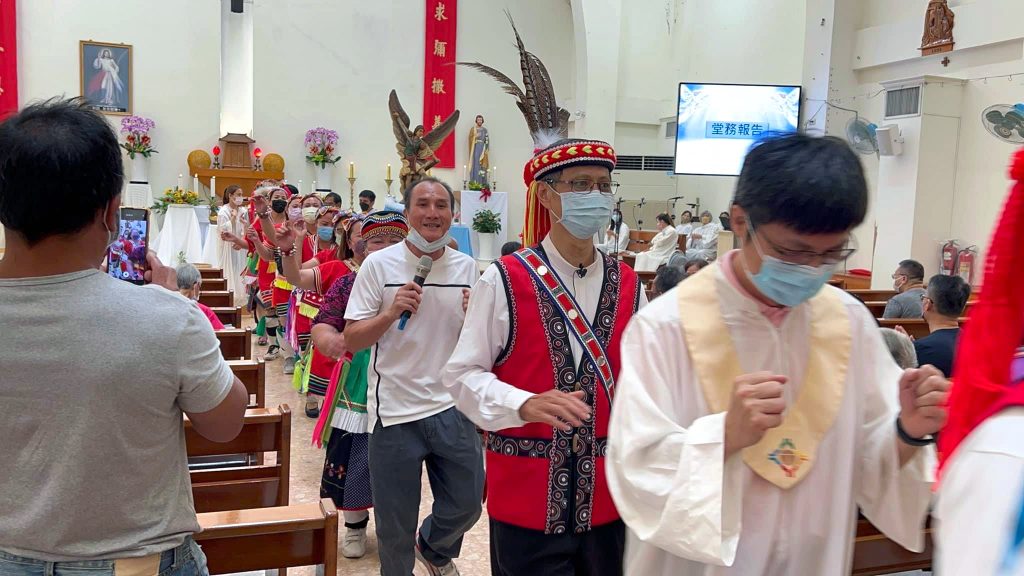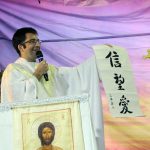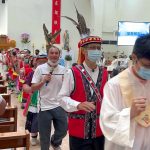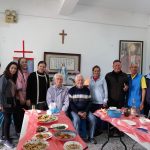Aventures missionaire – Taïwan
The challenge of languages and the disappearance of indigenous languages
Publié le 25/05/2023

Messe à Taïwan avec les Amis (peuple aborigène) en tenue traditionnelle.
For those who work with indigenous peoples, Taiwan presents a double challenge. First of all, there is the problem of learning a second language after having learned the official language, which is Mandarin. The second challenge is which language to choose for readings in Mass, for explanations, for prayers and, especially, for the singing. The choice is dictated by the help that is available on the day, and even that can vary from one Sunday to another, depending on family events (deaths, family celebrations). Such events often attract a large number of cousins, nephews and other relatives, who are usually younger, and who come back from the cities where they work and who never properly learned or have forgotten their native language. It is these irregular practitioners, who arrive unexpectedly, and who need to be attached to the Church, who really need a liturgy that speaks to them. But, often, there is little time, especially if they arrive late.
Evolution of languages in Taiwan
Having been in Taiwan for more than forty-five years, I have been able to observe the evolution of the languages used, especially in rural areas. Japanese has practically disappeared. It used to be spoken by the older generation as a common language for meetings between people from different ethnic groups. This was because, for them, primary education had been in Japanese, before and during the Second World War.
Today the common language used for communication between different ethnic groups is Mandarin, which is the official language and is taught in all schools, and is very widely used on TV, in administration and larger shops.
Even so, the Minnan Chinese dialect is putting up a stiff fight against the domination of official Mandarin, particularly in the towns and villages in the south and west of the island. On building sites and in other workplaces, manual workers of different kinds speak almost exclusively in Minnan. You could say that Minnan is the mother tongue of 70% of the population. This needs to be qualified, as in some families both languages are used.
Minnan is rarely used on television, but there are still traditional plays as well as other more modern ones that are performed in Minnan and there is a solid repertoire of both old and modern songs in Minnan.
Hakkas constitute just 10% of the population. The Chinese Hakka dialect is dying quickly. In Hakka families, parents are reluctant to use their mother tongue to speak to their children. They prefer to speak to them in Mandarin, to make it easier for them when they meet other people.
This is the case to an even greater degree for languages used by the various indigenous tribes that, together, constitute just 2 or 3% of the population. It is only in a few isolated families who want to maintain their identity that teach some basic knowledge of the language to their children, who would not in any case ever dare to use it outside of their families. In nearly all villages where indigenous people live, those under 50 years of age no longer speak the indigenous language. In the past, they called it their mother tongue. Nowadays they speak of the ‘tribal language’, as mums no longer use it to speak to their children.
People aged between 50 and 70 should, in theory, be able to speak both languages fluently. They were educated in Mandarin but, at home, they were still speaking their mother tongue, or perhaps we should call it the language of their grandparents. In practice, it is very rare to find someone who is comfortable with both languages, particularly when speaking in public. I would say between 3% and 4%. There are many more who do not speak either language fluently.
Speaking to communicate with the world
That got me thinking. At the beginning, like most missionaries, I encouraged parents to use their own languages so that they did not disappear. I thought of the language as cultural wealth that needed to be preserved. But now I have a better understanding of the attitude of mothers who, while regretting the disappearance of the language of their forebears, nevertheless choose to speak to their children in Mandarin from infancy. It is because language is not an element of culture in the same way as other cultural forms: music, songs, dances, costumes, sculpture, crafts, cooking recipes, etc. can be transmitted without it making much difference which language is used.
But the acquisition of language affects all one’s future education. In Taiwan, as in manyother countries, the race for good schools starts early and parents do not want to handicap their children by delaying their acquisition of the official language. Language is the basic tool for gaining access to scientific knowledge and cultural riches from around the world. With Mandarin, one has access to the essentials.
Acquisition of a language is also opening a gateway to other people. One might think – with good reason – that children expect the greatest possible opening that will let them communicate with all those they meet and which gives access to the culture shared by all. For more than thirty years, parents have therefore chosen to speak Mandarin to their children, to promote good schooling and good relations with the population in general.
What about in church?
Generally speaking, Christians like to keep their traditional songs in the tribal language. The melodies, which are mostly very beautiful, carry more emotion for them. For them, too, prayer and the entire liturgy are more a question of feeling than intellectual understanding and, as is often the case, the elderly are in the majority, so Mandarin is used less.
For those of us who are missionaries, however, who proclaim a message that is not always obvious, I can see some dangers ahead. The first people who became Christians, sixty or more years ago, did not ask many theoretical questions and accepted what they were told without thinking about it very much. Life was simpler then and people had to think more about eating than philosophising. There can be a temptation to want to remain in that cloistered world, sheltered from new ideas or a critical approach that might prove to be quite challenging. Among the older missionaries that I have known, the most ardent defenders of indigenous languages were far from being progressive in theological matters.
The danger is in failing to prepare young people for the world of tomorrow and for parishes in cities where everything is done in Mandarin. Under the pretext of maintaining cultural values, we risk losing everything. Cultures were not promised eternal life. They are like all living beings: they are born, they grow and develop, they live their lives and then die. As with the Pharaohs, all one can do is embalm them and put them in museums.
May the Holy Spirit inspire us to find other ways to instil the life and love of Christ in our hearts.
Fr Claude Louis-Tisserand
- Le père Nicolas de Francqueville évangélise à Taïwan.
- Messe à Taïwan avec les Amis (peuple aborigène) en tenue traditionnelle.
- La père Claude Louis Tisserand (au centre).


